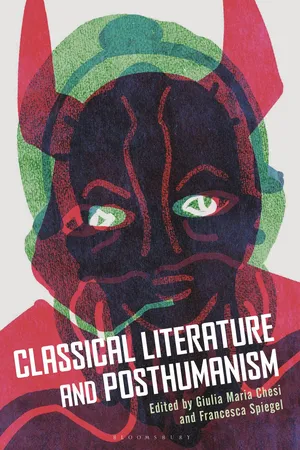
Classical Literature and Posthumanism
Giulia Maria Chesi, Francesca Spiegel
- 480 pages
- English
- ePUB (mobile friendly)
- Available on iOS & Android
Classical Literature and Posthumanism
Giulia Maria Chesi, Francesca Spiegel
About This Book
The subject of the posthuman, of what it means to be or to cease to be human, is emerging as a shared point of debate at large in the natural and social sciences and the humanities. This volume asks what classical learning can bring to the table of posthuman studies, assembling chapters that explore how exactly the human self of Greek and Latin literature understands its own relation to animals, monsters, objects, cyborgs and robotic devices. With its widely diverse habitat of heterogeneous bodies, minds, and selves, classical literature again and again blurs the boundaries between the human and the non-human; not to equate and confound the human with its other, but playfully to highlight difference and hybridity, as an invitation to appraise the animal, monstrous or mechanical/machinic parts lodged within humans. This comprehensive collection unites contributors from across the globe, each delving into a different classical text or narrative and its configuration of human subjectivity-how human selves relate to other entities around them. For students and scholars of classical literature and the posthuman, this book is a first point of reference.
Frequently asked questions
Information
PART I
DE/HUMANIZATION AND ANIMALS
CHAPTER 1
ODYSSEUS, THE BOAR AND THE ANTHROPOGENIC MACHINE1
I. Audience expectations and the analogical worldview
Table of contents
- Cover
- Half-Title Page
- Dedication
- Series Page
- Title Page
- Contents
- Notes on Contributors
- Theoretical Introduction: The Subject of the Human
- Introductions to Post/human Theories
- The Question of the Animal and the Aristotelian Human Horse
- Foucault, the Monstrous and Monstrosity
- How to Become a Cyborg
- Anders, Simondon and the Becoming of the Posthuman
- Part I De/humanization and Animals
- 1 Odysseus, the Boar and the Anthropogenic Machine
- 2 What Is It Like to Be a Donkey (With a Human Mind)? Pseudo-Lucian’s
- 3 Quam Soli Vidistis Equi: Focalization and Animal Subjectivity in Valerius Flaccus
- 4 Animality, Illness and Dehumanization: The Phenomenology of Illness in Sophocles’ Philoctetes
- 5 The Imperial Animal: Virgil’s Georgics and the Anthropo-/Theriomorphic Enterprise
- 6 Animals, Governance and Warfare in the Iliad and Aeschylus’
- 7 The Sovereign and the Beast: Images of Ancient Tyranny
- Part II The Monstrous
- 8 Typhoeus or Cosmic Regression (Theogony 821–880)
- 9 Demonic Disease in Greek Tragedy: Illness, Animality and Dehumanization
- 10 The Sphinx and Another Thinking of Life
- 11 When Rome’s Elephants Weep: Humane Monsters from Pompey’s Theatre to Virgil’s Trojan Horse
- 12 The Monstrosity of Cato in Lucan’s Civil War 9
- 13 Why Can’t I Have Wings? Aristophanes’ Birds
- Part III Bodies and Entanglements
- 14 The Seer’s Two Bodies: Some Early Greek Histories of Technology
- 15 Fluid Cypress and Hybrid Bodies as a Cognitively Disturbing Metaphor in Euripides’ Cretans
- 16 Body Politics in the Antiquitates Romanae of Dionysius of Halicarnassus
- 17 The Myth of Io and Female Cyborgic Identity
- 18 Cosmic, Animal and Human Becomings: A Case Study in Ancient Philosophy
- 19 Posthumanism in Seneca’s Happy Life: ‘Animalism’, Personificationand Private Property in Roman Stoicism (Epistulae Morales 113 and De Vita Beata 5–8)
- 20 Hagiography without Humans: Simeon the Stylite
- Part IV Objects, Machines and Robotic Devices
- 21 Assemblages and Objects in Greek Tragedy
- 22 Hybris and Hybridity in Aeschylus’ Persians: A Posthumanist Perspective on Xerxes’ Expedition
- 23 Malfunctions of Embodiment: Man/Weapon Agency and the Greek Ideology of Masculinity
- 24 Aeneid 12: A Cyborg Border War
- 25 The Presence of Presents: Speaking Objects in Martial’s Xenia and Apophoreta
- 26 Automatopoetae Machinae: Laws of Nature and Human Invention (Vitruvius 9.8.4–7)
- 27 Pandora and Robotic Technology Today
- 28 Art, Life and the Creation of Automata: On Pindar, Olympian 7.50–53
- 29 Staying Alive: Plato, Horace and the Written Text
- 30 Beyond the Beautiful Evil? The Ancient/Future History of Sex Robots
- Conclusions
- Notes
- 1
- Bibliography
- Index
- 1
- Copyright